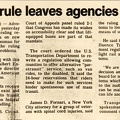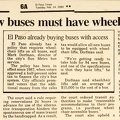A-12 /The Houston Post/Wednesday, February 15, 1989
NATION & WORLD
[Headline] Disabled hail ruling on bus access
[Subheading] Court requires transit agencies to install wheelchair lifts
ASSOCIATED PRESS
PHILADELPHIA — Advocates for the disabled Tuesday hailed a federal court ruling requiring wheelchair lifts on new public buses, but a spokesman for transit agencies said the ruling doesn‘t address vexing problems.
“We've been grappling with this for a long time," said Albert Engelken, deputy executive director of the American Public Transit Association in Washington.
He said wheelchair lifts receive limited use where they exist and are an added expense to transit agencies at a time when federal
subsidies are dwindling.
A 3rd U.S. Circuit Court ol Appeals panel ruled 2-1 Monday that Congress has made its wishes on accessibility clear, and lift-equipped buses are part ol that mandate. The court ordered the Department of Transportation to rewrite a regulation allowing communities to offer alternative paratransit service, such as van rides.
James D. Fornari, a New York City attorney for a group of veterans with spinal cord injuries, said the ruling will force transit systems to look for the most efficient means of serving disabled people. He said the ruling also could influence DOT regulations on light rail and commuter rail systems.
Transportation department spokesman Bob Marx said DOT attorneys had not seen the decision and would not comment.
Officials of Houston's Metropolitan Transit Authority also had not seen the decision, but MTA spokeswoman Carol Boudreaux said the authority would comply with any new regulations. Representatives of the disabled community in Houston lauded the ruling.
“The disabled community is excited and we hope Alan Kiepper, manager of Houston Metro, hears this message from the courts and the disabled community. Access is a civil right," said Vicki Harris, executive director of the Center for Independent Living.
Currently, Metro's MetroLift program provides scheduled curb-to-curb transportation for mentally or physically disabled persons who are unable to ride regular buses.
Bob Kafka, an American Disabled for Accessible Public Transportation representative who joined Harris at a news conference, said he believed the cost of retrofitting buses with wheelchair lifts would be too costly, but said he hoped the ruling would force Metro to buy new buses with lifts.
"Disabled people are part of this community, and they should have access to mainline transit," he said. Engelken said his association's board, which comprises the heads of transit agencies across the nation, believes agencies should be able to decide on a local basis how best to serve disabled people.
lt costs $15,000 to equip a bus with a wheelchair lift, and buses cost about $200,000, said Joaquin Bowman, a spokesman for the Southeastern Pennsylvania Transportation Authority.
- Created on
- Friday 12 July 2013
- Posted on
- Wednesday 22 July 2015
- Tags
- 3rd US Circuit Court of Appeals, ADAPT - American Disabled for Accessible Public Transportation, APTA - American Public Transit Association, Bob Kafka, buses, cost, disabled veterans, DOT, HCIL - Houston Center for Independent Living, Houston, Houston Metro, James Fornari, MetroLift, paratransit, retrofitting, SEPTA - Southeastern Penn. Transportation Authority, trains, Vicki Harris, wheelchair lifts
- Albums
- Visits
- 2736
- Rating score
- no rate
- Rate this photo


0 comments